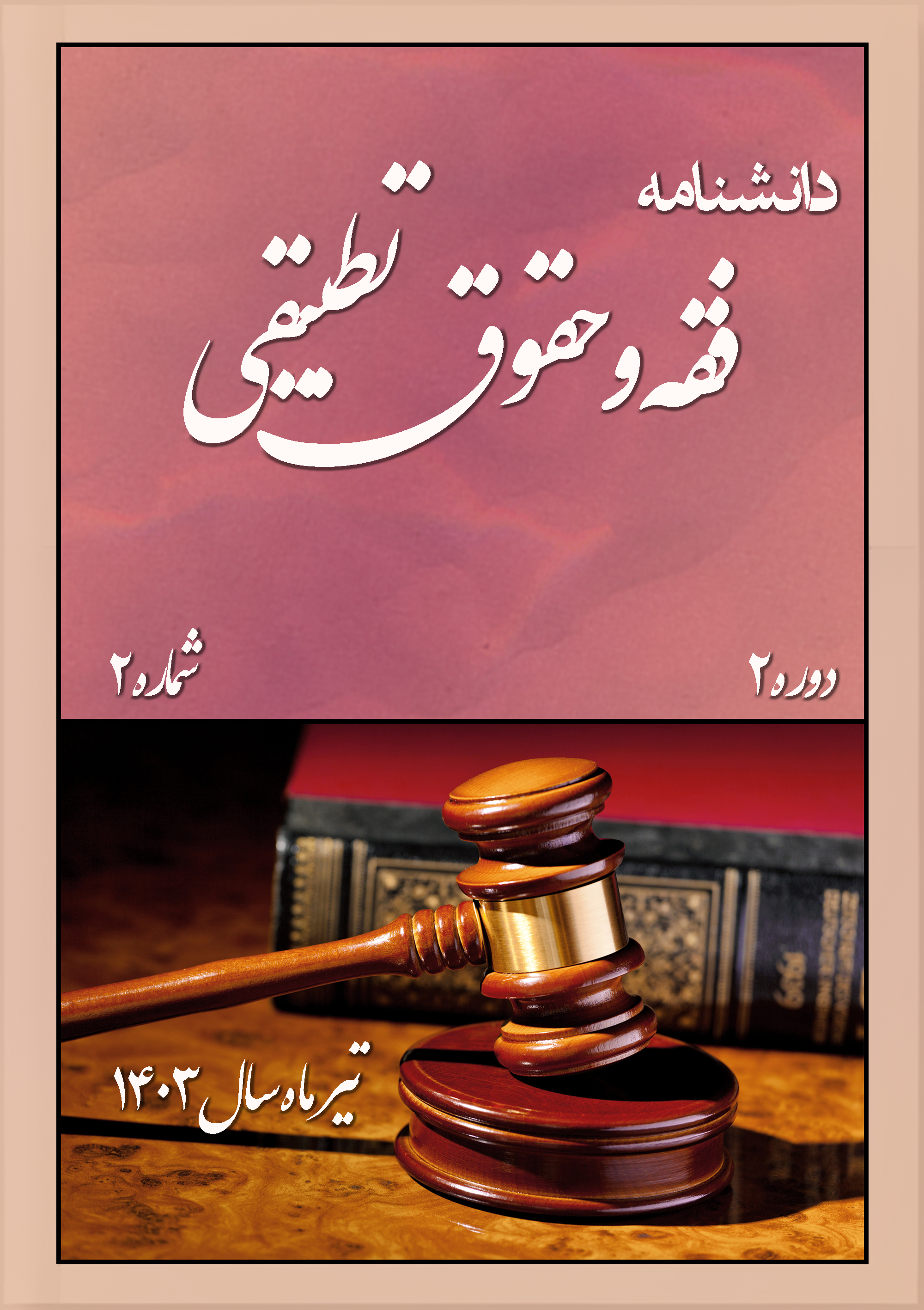The Criterion of Welfare in Child Discipline and the Examination of Liability Arising from Discipline
Keywords:
The child's best interest, child discipline, the guarantee resulting from discipline, the index of expediencyAbstract
The right to upbringing is considered one of the most fundamental rights of the child—a right whose realization depends on healthy, balanced, and appropriate education that meets the child’s physical, psychological, and emotional needs. The purpose of such upbringing is the flourishing of human potential and the attainment of the lofty ends envisioned by the Divine Lawgiver for humankind. Among the various instruments of upbringing, discipline constitutes a crucial yet delicate responsibility entrusted to parents. However, the authority to discipline is not absolute; rather, it is bound by rules, criteria, and conditions that ensure its legitimacy. One of the most significant among these is the criterion of observing the child’s welfare in the disciplinary process. Any form of punishment or discipline that exceeds the limits of reason and religious law, or that is motivated by anger, revenge, or ill will—thereby endangering the child’s higher interests—lacks legitimacy and renders the disciplining party liable. Accordingly, the welfare criterion occupies a fundamental position in legitimizing parental disciplinary actions, and adherence to it is a necessary condition for the disciplinarian to be absolved of liability. In the present study, using a documentary–library method and within a descriptive–analytical framework based on content analysis, the foundational concepts of “criterion,” “welfare,” “discipline,” and “punishment” are examined in both linguistic and jurisprudential–legal contexts. Subsequently, by employing authoritative sources in Imami jurisprudence and legal texts, the formal and substantive indicators and standards for assessing the child’s welfare in matters of discipline and punishment are derived. Due to their general and comprehensive nature, these indicators may be applied to various child-related legal issues, including the topic under discussion. Finally, the study proposes a framework for identifying the greater welfare (“maslahat aham”) based on religious and jurisprudential foundations, which may serve as a legal and jurisprudential basis for evaluating the legitimacy of disciplinary actions and resolving related liabilities.
Downloads
References
Al-Amili, Z. a.-D. i. A. (1990). Al-Rawdah al-Bahiyyah fi Sharh al-Lum‘ah al-Dimashqiyyah (1 ed.). Davari Bookstore.
Al-Hilli, N. a.-D. J. f. i. H. (1987). Shara’i al-Islam fi Masa’il al-Halal wa al-Haram (2 ed.). Isma‘iliyan Institute.
Al-Jaziri, A. R. i. M. A. (1983). Al-Fiqh Ala al-Mazahib al-Arba’a. Dar al-Kutub al-Ilmiyyah.
Al-Khoei, A. Q. (1992). Misbah al-Fiqahah.
Al-Kulayni, M. i. Y. q. (1986). Al-Kafi (4 ed.). Dar al-Kutub al-Islamiyyah.
Al-Tusi, A. J. f. M. i. a.-H. (1967). Al-Mabsut fi Fiqh al-Imamiyyah (M. T. Kashfi, Ed.). Maktabat al-Murtadawiyyah.
Alidoust, A. Q. (2011). (2 ed.). Research Institute for Islamic Culture and Thought.
Amini, E. (2013). Islam and Education (1 ed., Vol. 2). Parents and Teachers Association Publications.
Araki, M. A. (1994). Istifta’at. Maroof Publications.
Babbie, E. (2002). Research Methods in the Social Sciences (1 ed., Vol. 1). SAMT Publications.
Esfahanian Semnani, A., Mousavi Bojnourdi, S. M., & Hosseini, S. M. (2018). The Function of Welfare in Education and Moral Writing in Relation to Children. Journal of Ethical Research(34).
Golpayegani, M. R. (1996). Majma‘ al-Masa’il. Office of Ayatollah Haj Sheikh Hossein Ayuqi.
Golpayegani, S. M. R. (1900). Al-Hidayah. Dar al-Qur’an al-Karim.
Hakim, M. T. (1979). The General Principles of Comparative Jurisprudence. Al al-Bayt Institute for Printing and Publishing.
Hamed al-Alam, Y. (1995). Al-Maqasid al-‘Alamiyyah li al-Shari‘ah al-Islamiyyah (2 ed.). Al-Ma‘had al-‘Alami lil-Fikr al-Islami / Dar al-Hadith.
Hashemi Shahroudi, S. M., & Various, A. (2005). Dictionary of Jurisprudence According to the School of Ahl al-Bayt. Encyclopedia of Islamic Jurisprudence Institute.
Hosseini, D. (2002). The Role of Reward and Punishment in Islam. Islamic Research Center of IRIB.
Hurr al-Amili, M. i. H. (1871). Wasa’il al-Shi‘a ila Tahsil Masa’il al-Shari‘a (1 ed.). Al al-Bayt Institute.
Ibn Idris, a.-H. (1991). Al-Sara’ir. Islamic Publication Institute.
Ibn Manzur, M. (1702). Lisan al-Arab. Dar Ihya al-Turath al-Arabi.
Johari, I. i. H. (1997). Al-Sihah. Dar al-Fikr.
Makarem Shirazi, N. (1895). Nawar al-Usul (A. Qoddusi, Ed.). Nasl-e Javan.
Moein, M. (2002). Persian Dictionary (Farhang-e Farsi) (Vol. 2). Amir Kabir Publications.
Mohaghegh Damad, M., & Ghani Zadeh Bafqi, M. (2017). Determining the Types of Child Welfare from the Perspective of Imami Jurisprudence and Its Foundations. Private Law Studies, 47(1).
Morvarid, A. A. (1992). Silsilat al-Yanabi‘ al-Fiqhiyyah. Fiqh al-Shi‘a Institute.
Motahhari, M. (1996). Collected Works (5 ed.). Sadra Publications.
Muhaqqiq, A. (2000). Majma‘ al-Fa’idah wa al-Burhan. Islamic Publications Office of the Society of Seminary Teachers.
Musavi Khomeini, S. R. (1996). Tahrir al-Wasilah. Society of Seminary Teachers Publications.
Nafisi, A. A. (1964). Nafisi Dictionary (2 ed.). Khayyam Publications.
Najafi, M. H. (1983). Jawahir al-Kalam. Dar Ihya al-Turath al-Arabi.
Parsapour, M. B., & Nourbakhsh, S. (2015). Criteria for Evaluating the Child’s Welfare in Imami Jurisprudence, Iranian Law and the Convention on the Rights of the Child.
Pour Abdollah, K. (2016). The Rule of Welfare in Family Regulations. Dadgostar Publications.
Pour Abdollah, K., Hosseini, F. a.-S., & Sayar, M. M. (2013). The Scope of Parental Rights over Child Upbringing: A Comparative Study of Iranian Legal System and International Instruments. Strategic Women’s Studies(60).
Qaraei, T. (2014). Jurisprudential and Legal Study of Parental Limits and Authority in Child Discipline University of Qom, Faculty of Theology and Islamic Studies]. Qom.
Rahati Nush Abadi, E. (2015). A Study on Child Punishments in the Iranian Legal System with Emphasis on the Issue of Discipline Imam Sadiq University]. Tehran.
Rahbar, M. (2003). Analysis of the Applications of Welfare in Imami Jurisprudence Imam Sadiq University]. Tehran.
Shakeri Golpayegani, T. (2006). Islamic Criminal Policy. Farhang Islami Publications.
Tavakoli, A. (2005). Welfare in Shi‘a and Sunni Jurisprudence. Imam Khomeini Educational and Research Institute.
Tureihi, F. a.-D. (1996). Majma‘ al-Bahrayn (A. Hosseini, Ed. 3 ed.). Morteza Publications.
Downloads
Published
Submitted
Revised
Accepted
Issue
Section
License
Copyright (c) 1403 علی اکبر حامدی; طاهره سالاری نژاد, مریم حامدی (نویسنده)

This work is licensed under a Creative Commons Attribution-NonCommercial 4.0 International License.










